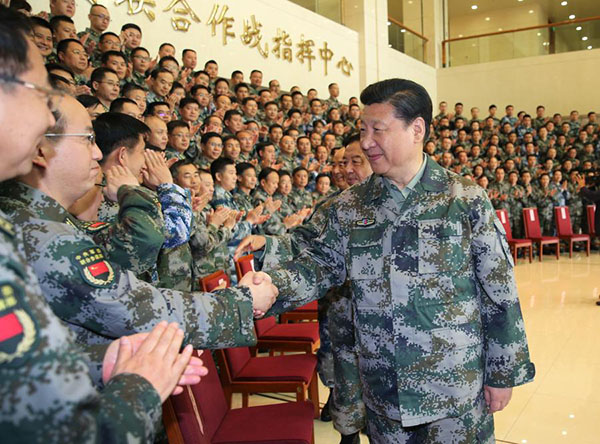


Chinese President Xi Jinping inspected the Central Military Commission (CMC) joint battle command center in Beijing on April 20, 2016. [Photo/Xinhua]
10 new teams taking posts in departments, theater commands of CMC to 'purify PLA'
As part of its revamped disciplinary reinforcement and anti-corruption system, central inspection teams are being sent to all main parts of the Chinese military.
After a training session on Tuesday and Wednesday, 10 teams of the Central Military Commission's newly appointed inspectors are assuming their posts in all CMC departments and theater commands.
This will be the first time the top military authority has established a standing anti-corruption force that will be directly under its control within its units, PLA Daily reported, adding that this will help reshape the military's disciplinary inspection system.
The move was planned by President Xi Jinping, who is also the CMC chairman, and is aimed at purifying the People's Liberation Army, a source close to the matter said.
The inspection teams directly reporting to the CMC will be more effective in improving the behavior of officers at major general level and above, he said.
There are 15 departments under the CMC and five theater commands, which means each inspection team will oversee two departments or commands on average.
It was not known whether these CMC departments and theater commands, which were formed in January at the height of the unprecedented military reform guided by Xi, have their own anti-graft bodies.
The former top PLA departments-general staff, political, logistics and armaments-as well as seven former regional commands had their own disciplinary inspection commissions.
The training session for inspectors was held by the CMC Disciplinary Inspection Commission. Senior officials from the Communist Party of China Central Commission for Discipline Inspection were invited to share their experience during the training.
General Xu Qiliang, vice-chairman of the CMC, asked inspectors to take advantage of the CMC's authority and the fact that they will be close to the units they supervise to fulfill their missions.
Ren Jianming, director of the Clean Governance Research Center at Beihang University in Beijing, said that sending disciplinary inspection teams to CMC departments and regional commands is part of the country's reform of its anti-corruption system.
He said it will take some time for people to see whether the measure will eliminate the roots of corruption within the military, suggesting the PLA should continue to explore ways to achieve this goal.
In February, the Chinese military set up a hotline and a mailbox for people to report corruption and other misconduct.
In late November, Xi vowed to give more independence and authority to disciplinary inspectors and auditors when he presided over a Central Military Commission meeting that officially unveiled the ongoing PLA reform.
Over the past three years, nearly 50 senior officers of the PLA and the Armed Police Force have been convicted or investigated for corruption allegations. They included Guo Boxiong and Xu Caihou, both former vice-chairmen of the Central Military Commission. An investigation of Guo was launched in April last year and he is awaiting trial. Xu died in mid-March last year before standing trial.
 Beijing Style: ready for bare legs
Beijing Style: ready for bare legs Century-old station sees railyway evolution
Century-old station sees railyway evolution Amazing scenery of Xisha Islands
Amazing scenery of Xisha Islands Enthusiasts perform Kung Fu at Wudang Mountain
Enthusiasts perform Kung Fu at Wudang Mountain Stunning photos of China's fighter jets in drill
Stunning photos of China's fighter jets in drill Monk's mummified body to be made into a gold Buddha statue
Monk's mummified body to be made into a gold Buddha statue Asia's longest and highest suspension bridge to open to traffic
Asia's longest and highest suspension bridge to open to traffic China's first interactive robot looks like a beauty
China's first interactive robot looks like a beauty Vietnamese Su-30 fighters fly over Nanwei Island in South China Sea
Vietnamese Su-30 fighters fly over Nanwei Island in South China Sea Top 20 hottest women in the world in 2014
Top 20 hottest women in the world in 2014 Top 10 hardest languages to learn
Top 10 hardest languages to learn 10 Chinese female stars with most beautiful faces
10 Chinese female stars with most beautiful faces China’s Top 10 Unique Bridges, Highways and Roads
China’s Top 10 Unique Bridges, Highways and Roads Unpredictable Trump could swing either way on China
Unpredictable Trump could swing either way on China Military institution scandal highlights shady Putianese private clinics
Military institution scandal highlights shady Putianese private clinics How to maintain property in communist system looms large as land warrants expire
How to maintain property in communist system looms large as land warrants expire Yiwu, China’s wholesale capital, switches its economic growth engine from manufacturing to design
Yiwu, China’s wholesale capital, switches its economic growth engine from manufacturing to designDay|Week